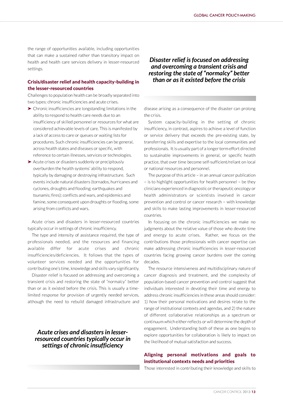
GLOBAL CANCER POLICY-MAKING
the range of opportunities available, including opportunities
that can make a sustained rather than transitory impact on
health and health care services delivery in lesser-resourced Disaster relief is focused on addressing
settings. and overcoming a transient crisis and
restoring the state of “normalcy” better
Crisis/disaster relief and health capacity-building in than or as it existed before the crisis
the lesser-resourced countries
Challenges to population health can be broadly separated into
two types: chronic insufficiencies and acute crises.
‰ Chronic insufficiencies are longstanding limitations in the disease arising as a consequence of the disaster can prolong
ability to respond to health care needs due to an the crisis.
insufficiency of skilled personnel or resources for what are System capacity-building in the setting of chronic
considered achievable levels of care. This is manifested by insufficiency, in contrast, aspires to achieve a level of function
a lack of access to care or queues or waiting lists for or service delivery that exceeds the pre-existing state, by
procedures. Such chronic insufficiencies can be general, transferring skills and expertise to the local communities and
across health states and diseases or specific, with professionals. It is usually part of a longer term effort directed
reference to certain illnesses, services or technologies. to sustainable improvements in general, or specific health
‰ Acute crises or disasters suddenly or precipitously practice, that over time become self-sufficient/reliant on local
overburden the health systems’ ability to respond, or national resources and personnel.
typically by damaging or destroying infrastructure. Such The purpose of this article – in an annual cancer publication
events include natural disasters (tornados, hurricanes and – is to highlight opportunities for health personnel – be they
cyclones, droughts and flooding; earthquakes and clinicians experienced in diagnostic or therapeutic oncology or
tsunamis; fires); conflicts and wars, and epidemics and health administrators or scientists involved in cancer
famine, some consequent upon droughts or flooding, some prevention and control or cancer research – with knowledge
arising from conflicts and wars. and skills to make lasting improvements in lesser-resourced
countries.
Acute crises and disasters in lesser-resourced countries In focusing on the chronic insufficiencies we make no
typically occur in settings of chronic insufficiency. judgments about the relative value of those who devote time
The type and intensity of assistance required, the type of and energy to acute crises. Rather, we focus on the
professionals needed, and the resources and financing contributions those professionals with cancer expertise can
available differ for acute crises and chronic make addressing chronic insufficiencies in lesser-resourced
insufficiencies/deficiencies. It follows that the types of countries facing growing cancer burdens over the coming
volunteer services needed and the opportunities for decades.
contributing one’s time, knowledge and skills vary significantly. The resource intensiveness and multidisciplinary nature of
Disaster relief is focused on addressing and overcoming a cancer diagnosis and treatment, and the complexity of
transient crisis and restoring the state of “normalcy” better population-based cancer prevention and control suggest that
than or as it existed before the crisis. This is usually a time- individuals interested in devoting their time and energy to
limited response for provision of urgently needed services, address chronic insufficiencies in these areas should consider:
although the need to rebuild damaged infrastructure and 1) how their personal motivations and desires relate to the
range of institutional contexts and agendas, and 2) the nature
of different collaborative relationships as a spectrum or
continuum which either reflects or will determine the depth of
engagement. Understanding both of these as one begins to
Acute crises and disasters in lesser- explore opportunities for collaboration is likely to impact on
resourced countries typically occur in the likelihood of mutual satisfaction and success.
settings of chronic insufficiency
Aligning personal motivations and goals to
institutional contexts needs and priorities
Those interested in contributing their knowledge and skills to
CANCER CONTROL 2013 13